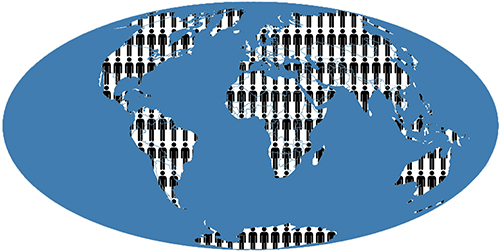
The world is a big place. As long as there have been people walking around, we’ve been exploring and procreating to further our society. Now we’re halfway through 2013, and our population is well into the billions.
Recently, the United Nations released new population projections. They’re predicting that the world will hit 7.2 billion people next month, and it’s estimated to reach nearly 11 billion by 2100. That’s a lot of people running around.
Now, not to be one of those people, but the Earth is not an infinite entity. With different creatures being added to the endangered species list every day, it’s important to remember that our time on this planet is not going to last forever. Another thing to consider is the rising amount of pollution and the still-imminent threat of global warming.
When you consider that we’re going to be reaching maximum capacity within the next century, pollution, global warming and the loss of natural resources are even more terrifying. However, like Vice magazine stated in a recent article, “Overpopulation is a tricky one to deal with.”
Population control is an extremely touchy subject. If approached in a specific way, one could argue that a country would be doing it for the greater good and preventing a quicker loss of resources. The counterargument would be that the government has no right to play a role in how many offspring people can have. Plenty of other countries have used different methods of population control to counteract overpopulation, but those countries also deny their citizens many basic human rights.
Vice interviewed Michael E. Arth, an urban designer and ex-politician, on the subject of overpopulation. He discussed the effects of population growth on the environment. We already know that a greater number of people have a more negative effect, but according to Arth, we should also be concerned about the amount of research being poured into life extension.
Life extension involves staving off the effects of aging and dying, and it’s projected we’ll have some form of effective means to do that within the next few decades. Arth claims that if people are living longer, it’s only going to amplify the negative effects of overpopulation—and it’s a strong argument for greater population control.
“That’s why we have to get started now. Waiting just compounds the problem,” Arth said. “World population increases by 220,000 every day, after accounting for the 155,000 who die. It’s truly a hydra-headed problem, because for every person that is cut down by death, more than two are born.”
Arth went on to talk about the fact that China would have “two billion people today if not for their population policies.” But even with population control, 350 million more Chinese were added to China’s population since 1978. That’s a lot of people in just one country within that span of time.
In conclusion, Arth stated that the solution—for China and the rest of the world—would be a choice-based, marketable birth license plan, or “birth credits.” Birth credits are a more humane solution to overpopulation, and they would replace past tactics such as forced sterilization and implemented birth control.
Birth credits would allow an individual to have as many children as she wished, as long as she buys the proper licensing beyond an average allotment. The cost of a birth credit would be determined by the current market, and would also represent “a tiny fraction of the real cost of raising a child.”
I like Arth’s solution. It solves the problem in a way that doesn’t really infringe upon the human right to procreate. Arth’s plan would also allot each person half a birth credit—so when two people come together as a couple, they would be able to combine the half-credits to have a child.
The most important argument against any kind of population control is whether it’s ethical to dictate procreation. However, while we do have the right to have babies, we also need to realize that over-breeding means disregarding our fellow humans. Arth said we should always strive for the lowest possible population growth in order to protect the environment, our resources and ourselves.
It’s a sticky situation. We are approaching a zenith in our population. Rather than living in some weird, fatalistic fantasy where we all have 10 children (this is my nightmare, just so you all know), we need to take a good, hard look at reality and do our part to delay a planet with 11 billion people for as long as we can.

